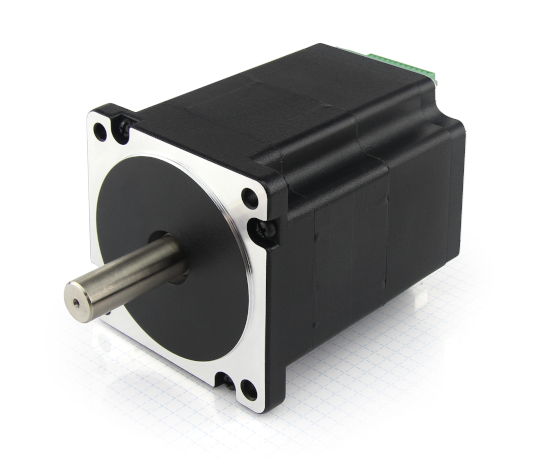Technical Manual PD6-C
Fieldbus: CANopen / USB
For use with the following variants:
PD6-C8918S6404-E-09, PD6-C8918M9504-E-09, PD6-C8918L9504-E-09, PD6-CB87S048030-E-09, PD6-CB80M048030-E-09

| Valid for firmware version FIR-v2213 and higher | Manual version 3.3.0 |
| and hardware version W003 and higher | to the archive |
Introduction
The PD6-C is a brushless motor with integrated controller. The integrated absolute encoder makes immediate operation possible in closed loop mode without homing.
This manual describes the functions of the controller and the available operating modes. It also shows how you can address and program the controller via the communication interface.
You can find further information on the product on us.nanotec.com.
Version information
| Manual version | Date | Changes | Firmware version |
|---|---|---|---|
| 1.0.0 | 08.04.2016 | Edition | FIR-v1614 |
| 1.0.1 | 22.07.2016 | Additions and error corrections | FIR-v1626 |
| 2.0.0 | 01/2018 |
|
FIR-v1650 |
| 2.0.1 | 04/2019 | Additions and error corrections | FIR-v1650 |
| 3.0.0 | 10/2019 | New firmware generation: see document Instructions on how to perform firmware update to version: FIR-v1939. | FIR-v1939 |
| 3.1.0 | 11/2020 |
|
FIR-v2039 |
| 3.2.0 | 09/2021 | Additions and error corrections | FIR-v2139 |
| 3.3.0 | 07/2022 | Correction of the baud rate values in Setting node-ID and baud rate. Changes in chapter Controller structure: New objects 321Ah, 321Bh, 321Ch, 321Dh and 321Eh for the control parameters replace 320Eh. The current controller in open-loop is now only parameterized in 3210h, object 320Fh has been removed. New object 6007h Abort Connection Option Code New object 230Eh Timer |
FIR-v2213 |
Copyright, marking and contact
© 2013 – 2022 Nanotec Electronic GmbH & Co. KG. All rights reserved.
Nanotec Electronic GmbH & Co. KG
Kapellenstraße 6
85622 Feldkirchen
Germany
Phone: +49 89 900 686-0
Fax: +49 (89) 900 686-50
Microsoft® Windows® 98/NT/ME/2000/XP/7/10 are registered trademarks of the Microsoft Corporation.
Intended use
The PD6-C motor with integrated controller is used as a component of drive systems in a range of industrial applications.
Use the product as intended within the limits defined in the technical data (in particular, see Permissible operating voltage) and the approved Environmental conditions.
Under no circumstances may this Nanotec product be integrated as a safety component in a product or system. All products containing a component manufactured by Nanotec must, upon delivery to the end user, be provided with corresponding warning notices including instructions for safe use and safe operation. All warning notices provided by Nanotec must be passed on directly to the end user.
Target group and qualification
The product and this documentation are directed towards technically trained specialists staff such as:
- Development engineers
- Plant engineers
- Installers/service personnel
- Application engineers
Only specialists may install, program and commission the product. Specialist staff are persons who
- have appropriate training and experience in working with motors and their control,
- are familiar with and understand the content of this technical manual,
- know the applicable regulations.
Warranty and disclaimer
Nanotec assumes no liability for damages and malfunctions resulting from installation errors, failure to observe this manual or improper repairs. The selection and use of Nanotec products is the responsibility of the plant engineer or end user. Nanotec accepts no responsibility for the integration of the product in the end system.
Our general terms and conditions at www.nanotec.com apply.
EU directives for product safety
The following EU directives were observed:
- RoHS directive (2011/65/EU, 2015/863/EU)
- EMC directive (2014/30/EU)
Other applicable regulations
In addition to this technical manual, the following regulations are to be observed:
- Accident-prevention regulations
- Local regulations on occupational safety
Used icons
All notices are in the same format. The degree of the hazard is divided into the following classes.
Emphasis in the text
The following conventions are used in the document:
Underlined text indicates cross references and hyperlinks:
- The following bits in object 6041h (statusword) have a special function:
- A list of available system calls can be found in chapter NanoJ functions in the NanoJ program.
Text set in italics marks named objects:
- Read the installation manual.
- Use the Plug & Drive Studio software to perform the auto setup.
- For software: You can find the corresponding information in the Operation tab.
- For hardware: Use the ON/OFF switch to switch the device on.
A text set in Courier marks a code section or programming command:
- The line with the
od_write(0x6040, 0x00, 5 );command has no effect. - The NMT message is structured as follows:
000 | 81 2A
A text in "quotation marks" marks user input:
- Start the NanoJ program by writing object 2300h, bit 0 = "1".
- If a holding torque is already needed in this state, the value "1" must be written in 3212h:01h.
Numerical values
Numerical values are generally specified in decimal notation. The use of hexadecimal notation is indicated by a subscript h at the end of the number.
The objects in the object dictionary are written with index and subindex as follows: <Index>:<Subindex>
Both the index as well as the subindex are specified in hexadecimal notation. If no subindex is listed, the subindex is 00h.
Example: Subindex 5 of object 1003h is addressed with 1003h:05h, subindex 00 of object 6040h with 6040h.
Bits
The numbering of individual bits in an object always begins with the LSB (bit number 0). See the following figure, which uses data type UNSIGNED8 as an example.

Counting direction (arrows)
In figures, the counting direction is always in the direction of an arrow. Objects 60C5h and 60C6h depicted as examples in the following figure are both specified as positive.


